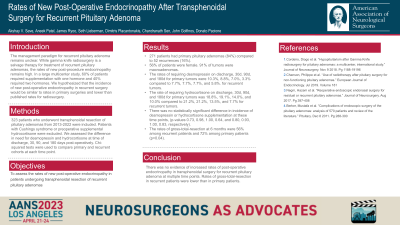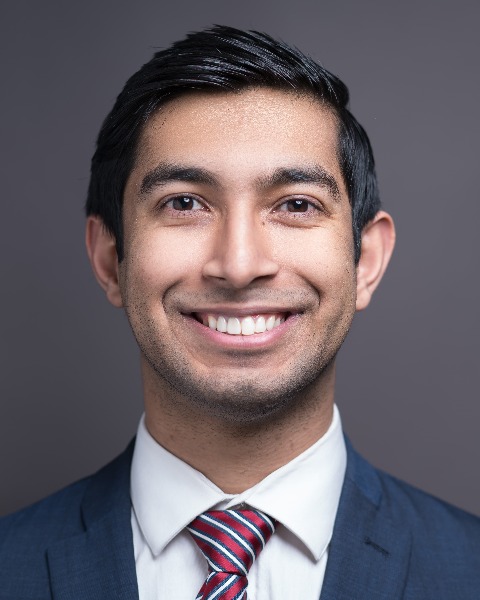Rates of New Post-Operative Endocrinopathy After Transphenoidal Surgery for Recurrent Pituitary Adenoma
Rates of New Post-operative Endocrinopathy After Transphenoidal Surgery for Recurrent Pituitary Adenoma
Friday, April 21, 2023


Akshay V. Save, MD (he/him/his)
Resident
NYU Langone
New York, New York, United States
ePoster Presenter(s)
Introduction: The management paradigm for recurrent pituitary adenoma remains unclear. While gamma knife radiosurgery is a salvage therapy for treatment of recurrent pituitary adenomas, the rates of new post-procedure endocrinopathy remains high. In a large multicenter study, 60% of patients required supplementation with one hormone and 40% required two hormones. We hypothesized that the incidence of new post-operative endocrinopathy in recurrent surgery would be similar to rates in primary surgeries and lower than published rates for radiosurgery.
Methods: 323 patients who underwent transphenoidal resection of pituitary adenomas from 2013-2022 were included. Patients with Cushings syndrome or preoperative supplemental hydrocortisone were excluded. We assessed the difference in need for desmopressin and hydrocortisone at time of discharge, 30, 90, and 180 days post-operatively. Chi-squared tests were used to compare primary and recurrent cohorts at each time point.
Results: 271 patients had primary pituitary adenomas (84%) compared to 52 recurrences (16%). 56% of patients were female. 91% of tumors were macroadenomas. The rates of requiring desmopressin on discharge, 30d, 90d, and 180d for primary tumors were 10.3%, 8.8%, 7.0%, 3.3% compared to 7.7%, 7.7%, 7.7%, and 5.8%. for recurrent tumors. The rate of requiring hydrocortisone on discharge, 30d, 90d, and 180d for primary tumors was 18.8%, 19.1%, 14.0%, and 10.0% compared to 21.2%, 21.2%, 13.5%, and 7.7% for recurrent tumors. There was no statistically significant difference in incidence of desmopressin or hydrocortisone supplementation at these time points, (p-values 0.73, 0.98, 1.00, 0.64, and 0.80, 0.93, 1.00, 0.83, respectively). The rates of gross-total-resection at 6 months were 56% among recurrent patients and 72% among primary patients (p=0.04).
Conclusion : There was no evidence of increased rates of post-operative endocrinopathy in transphenoidal surgery for recurrent pituitary adenoma at multiple time points. Rates of gross-total-resection in recurrent patients were lower than in primary patients.
Methods: 323 patients who underwent transphenoidal resection of pituitary adenomas from 2013-2022 were included. Patients with Cushings syndrome or preoperative supplemental hydrocortisone were excluded. We assessed the difference in need for desmopressin and hydrocortisone at time of discharge, 30, 90, and 180 days post-operatively. Chi-squared tests were used to compare primary and recurrent cohorts at each time point.
Results: 271 patients had primary pituitary adenomas (84%) compared to 52 recurrences (16%). 56% of patients were female. 91% of tumors were macroadenomas. The rates of requiring desmopressin on discharge, 30d, 90d, and 180d for primary tumors were 10.3%, 8.8%, 7.0%, 3.3% compared to 7.7%, 7.7%, 7.7%, and 5.8%. for recurrent tumors. The rate of requiring hydrocortisone on discharge, 30d, 90d, and 180d for primary tumors was 18.8%, 19.1%, 14.0%, and 10.0% compared to 21.2%, 21.2%, 13.5%, and 7.7% for recurrent tumors. There was no statistically significant difference in incidence of desmopressin or hydrocortisone supplementation at these time points, (p-values 0.73, 0.98, 1.00, 0.64, and 0.80, 0.93, 1.00, 0.83, respectively). The rates of gross-total-resection at 6 months were 56% among recurrent patients and 72% among primary patients (p=0.04).
Conclusion : There was no evidence of increased rates of post-operative endocrinopathy in transphenoidal surgery for recurrent pituitary adenoma at multiple time points. Rates of gross-total-resection in recurrent patients were lower than in primary patients.
